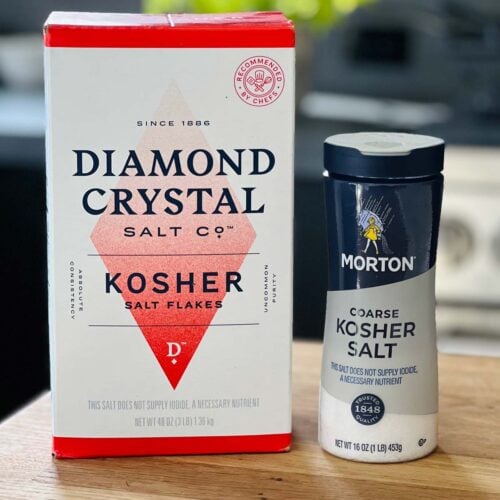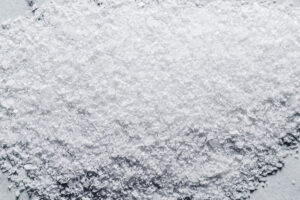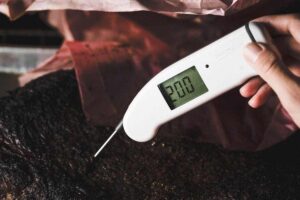Salt is the most important and most used ingredient when it comes to cooking. It brings out the flavor of the food. Salt is just salt, except when it comes to texture and measuring it out. Since almost every type and even brand of specific types of salt (like kosher salt) has a different granule size, it will measure out very differently by volume.
Salts are equal the same by weight, but not by volume. They can’t simply be swapped out 1 to 1 in a recipe.
Recipes seldom specify the exact brand or type of salt they used when developing the recipe, yet using the correct quantity, variety and specific brand can make all the difference in your final dish, leaving it either under or over-seasoned.
The Basic Ratio
(The 3 Most Popular Types of Salt in Cooking)
1 part Morton table Salt =
1 ½ parts Morton Kosher Salt =
2 parts Diamond Crystal Kosher Salt
As you can see, there is a drastic difference between Diamond Crystal brand kosher salt and table salt. Table salt contains twice as much salt by volume as Diamond Crystal kosher.
While converting measurements might not make a huge difference with very small measurements, it becomes critical for larger quantities, like when making a brine. Converting measurements properly when you need to substitute table salt for kosher salt (or vice versa) requires an understanding of the key physical properties of each that impact volume—namely, grain size and density.
To go deeper into salt, check out our Salt 101 Guide.
Salt Conversion Chart
This salt conversion chart features the three most popular types of salt for cooking: Diamond Crystal Kosher Salt, Morton Kosher Salt and Morton Table Salt. Since the recipes on this website call for Diamond Crystal brand, the chart features this brand and converts it to the others.
| Diamond Kosher | Morton Kosher | Morton Table |
|---|---|---|
| 1/4 tsp | 1/4 tsp | 1/4 tsp |
| 1/2 tsp | 1/4 tsp. + 1/8 tsp | 1/4 tsp |
| 1 tsp | 3/4 tsp | 1/2 tsp |
| 1 Tbsp | 1 1/2 tsp | 1 1/8 tsp |
| 1/4 cup | 3 Tbsp | 2 Tbsp |
| 1/2 cup | 1/4 cup + 2 Tbsp | 1/4 cup |
| 3/4 cup | 1/2 cup + 3 Tbsp | 1/4 cup + 2 Tbsp |
| 1 cup | 3/4 cup | 1/2 cup |
Salt Conversion Calculator
This calculator is in beta and is still being tested. To use it, select the salt type to convert from, enter the quantity, select the units for measurement, and then click “convert.” It will output the converted amount for the other two types of salt.
All Salts are Equal by Weight
Measuring by weight will make the salts equal in saltiness. The difference by volume comes in the grain size and shape. 1 gram of Diamond kosher salt is equal to 1 gram of Morton kosher, or any other type of salt. By volume measurement, they are not the same because the grain size is different. Morton kosher salt has a finer granule, so more granules are densely packed into the measuring device, and more “salt” fits in by that volume. Diamond Crystal kosher has larger flakes, which take up more space.
Because of this, it is ideal to measure your salt by weight for the most accurate measurements, though this is not very realistic for how we cook every day.
Measuring Salt with a Pinch
Once you have the measurements converted, your fingers are a great and pretty accurate tool for measuring salt amounts. As a general guide:
- 2-finger pinch = 1/8 tsp
- 3-finger pinch = 1/4 tsp
- 4-finger pinch = 1/2 tsp
- 5-finger pinch = 1 tsp
These measurements are with my fingers using Diamond Crystal kosher salt. Do your own pinch test with the type of salt you use to get an accurate measurement.
A Few Salting Tips
- Stick with one brand as your main salt for more consistent results. My favorite brand by far is Diamond Crystal kosher salt.
- Always be taste testing and adjust seasoning as needed
- Season in layers – Instead of salting all at the beginning or all at the end, season a little at a time as you go through the steps.
- Season your food at the right time. Meats can benefit greatly by being seasoned well ahead of cooking, while most fish and vegetables should be salted right before or during cooking.
- Table salt is “saltier” by volume than kosher salt and coarse sea salt. Because of the small granule size, table salt also dissolves the easiest and it is also the least expensive salt.
FAQs
To convert kosher salt to regular table salt, use the following ratios:
For Morton Kosher Salt: 1 part Morton Kosher Salt equals 1½ parts regular table salt.
For Diamond Crystal Kosher Salt: 1 part Diamond Crystal Kosher Salt equals 2 parts regular table salt.
Salt can vary in weight depending on its type and density, which is based on the granule size. However, as a general guideline:
Table Salt (Fine): 1 teaspoon = approximately 6 grams
Diamond Crystal Kosher Salt (Coarse): 1 teaspoon = approximately 3 grams
These values are approximate and can vary based on factors such as the size of the salt crystals and how densely they are packed. It’s always best to use a kitchen scale for precise measurements, especially in recipes where accuracy is crucial.






